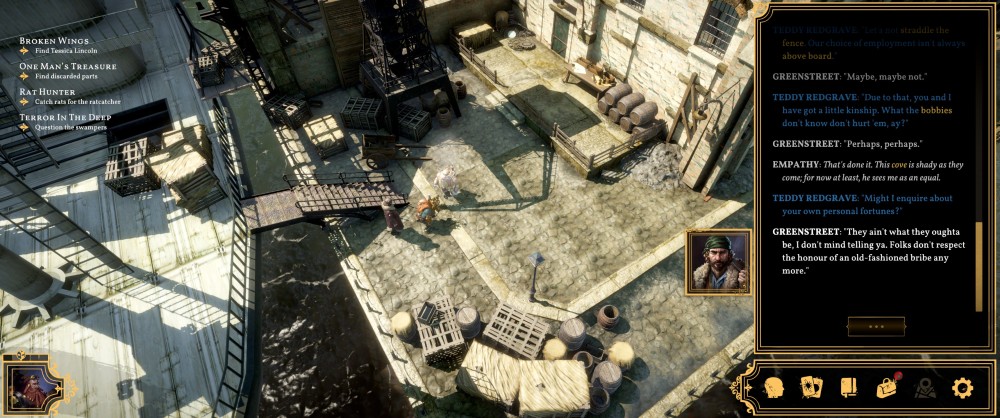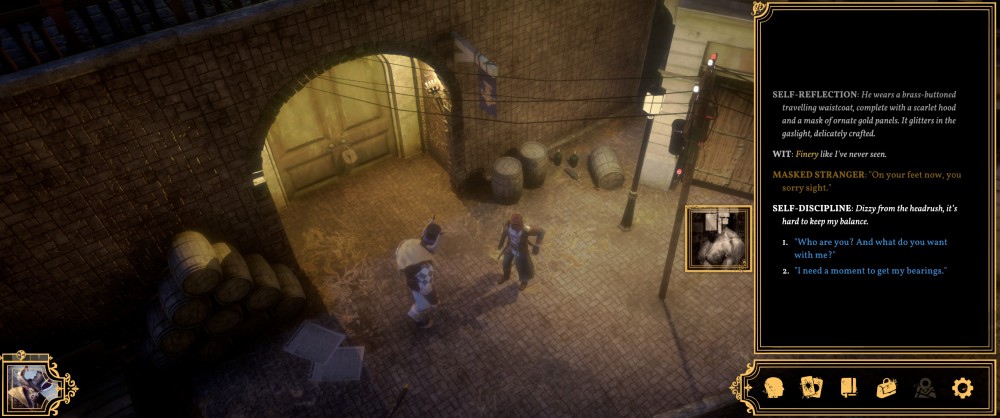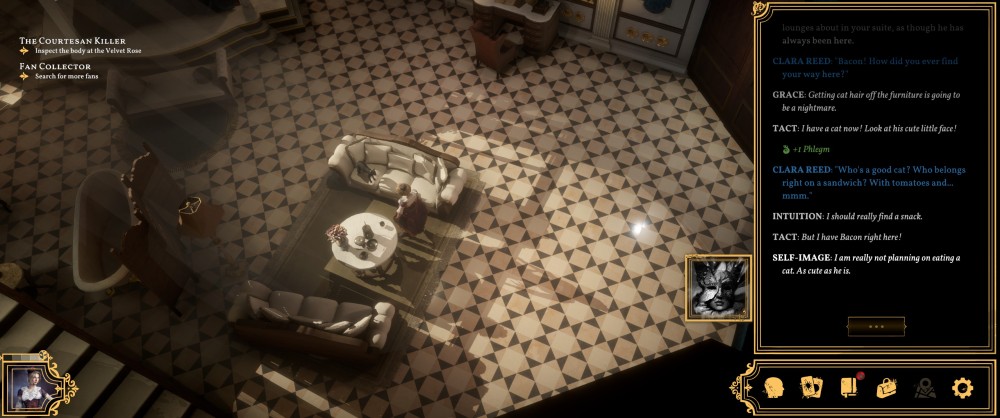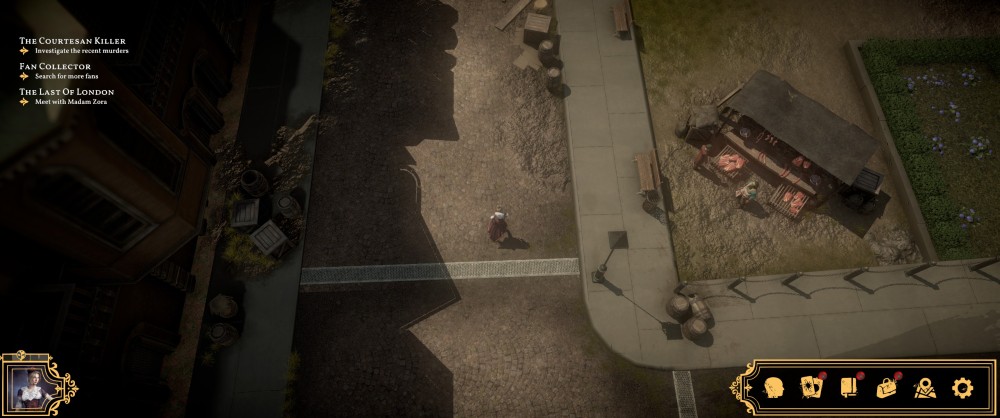As a CRPG set in a Steampunk version of London and starring a Minotaur illusionist, Sovereign Syndicate certainly makes a striking first impression. Heavily influenced by Disco Elysium, this game from Crimson Herring aims to tell a strong story via multiple points of view, eschewing combat in favour of dialogue. As the team’s first project, it’s pretty impressive and worth taking a look at if you like your prose thicc and an emphasis on storytelling above anything else.
The first character introduced is a minotaur by the name of Atticus Daley, a man/bull with a constant stormcloud above his head. He awakens in a dingy alley, the result of yet another gin-induced bender, and is greeted by a mysterious stranger seeking to enlist his aid. Atticus is a complicated chap, constantly at war with his baser instincts, beset by a traumatic childhood that he’s never truly moved on from and also a bit of a charming rogue in his own brutish way. He also happens to be a magician, a common thing among Minotaurs as they like to use illusions to make themselves appear human in order to navigate society more smoothly.
Miss Clara Reed is the second character to join the cast and is introduced in a drastically different way, awakening in a plush bed aboard a floating dirigible owned by a very wealthy Cyclops. Such are the dubious privileges of being a prostitute. Clara plies her services out of the Velvet Rose, but she has aims to leave dreary London in search of a better life and we join her on the same she intends to enact her plan. It doesn’t take long before she’s caught up investigating a serial killer seemingly targeting Clara’s fellow brothers and sisters of the night.
Finally, we have Teddy Redgrave, a very smart Dwarf who likes to tinker with machinery, hence his robotic pal Otto. But Teddy’s real job is as a monster hunter, and he has a reputation for being extremely good at it, especially if the target is a Werewolf. Of the three leads, he’s probably the most cheerful of the bunch, seemingly always ready to poke some fun or enter into an enthusiastic conversation with anyone he meets.
Release Date: 15/01/2024
Available On: PC
Reviewed On: PC
Developed By: Crimson Herring
Published By: Crimson HerringReview code provided by the publisher.
If you’re already a shade bemused by the sheer amount of weirdness being thrown around, then that’s completely fair. Sovereign Syndicate does throw you into the deep end of its world, a dirty Steampunk version of London where people amble around with metal augmentations, crime syndicates are everywhere, top hats are the height of fashion and there’s a great bloody electric fence used to pen in the problematic werewolf population. There’s a lot going on, and yet the game does a good job of pulling you through it all. Part of that is that most of the proper nouns and slang can be moused over for a quick explanation, and thus terms like dockhound, dolly, and bobby easily slip into your consciousness. Within the first hour, I was already comfortable in the world, had a grasp on how people talked and wanted to know more, always the hallmark of an interesting universe.

The first time you’re introduced to each of the three protagonists you’re also given a chance to customise them slightly by picking out a class. Now, I’m not talking about choosing between typical RPG classes because there is nearly zero combat within the game. The few moments of violence that occur happen as a result of a dialogue choice, and you have no direct control. No, these offer slightly different stats for the characters which will in turn feed into what replies they can give and whether or not skill checks will be successful. For example, you could opt for a more brutish Atticus who uses his natural size and strength to intimidate, or perhaps choose to gear him more toward his wit and self-restraint, which is what I went for, flying in the face of his obvious alcohol addiction.
Most of the role-playing side of things comes from the options you choose when conversing with others. If you pick an option marked with a personality trait, you’ll earn a little Bile (I’m not kidding) toward that particular trait, potentially levelling it up and making skill checks easier. While Atticus, Clara and Teddy are all predefined characters you inhabit, these moments in the conversations let you shape the details of who they are. My Teddy was highly empathetic, making it easier for him to connect with others and thus get through to them, while my Clara focused more on Grace, her ability to socially blend in and smooth over any wrinkles and issues. But I could have chosen to make Teddy a touch more brutal, in tune with his prior military service, or have Clara more deeply connected with her intuition.
Sovereign Syndicate wraps up its skill checks in a nice little steampunk bow, too. They are just dice rolls that occur behind the scenes, but the game presents the dice as a tarot deck instead. Your chosen skill (you can often try a skill check using a few different skills) is simply tallied up with the total on the drawn card and compared to the number needed to succeed. It’s that simple.
However, the choices you make and the skill checks you perform are slightly undermined by the sensation that none of it really matters. As far as I can tell via a couple of playthroughs, there are very few fail states or consequences to failed skill checks. At most, you might not get some information or be unable to complete an optional, and ultimately it could affect which of the three endings you get. That’s it. The more I played, the more disconnected I felt between what I was choosing to do and how things were actually progressing.

There’s also no way to know what sort of options are going to pop up, either, so you can’t level up with any sense of a plan. Really, the only thing you can do is to pick your best trait whenever possible to level it up, and if that option isn’t available pick the next best one. That’s it. After that, all you can hope is future skill checks favour your best skill or else you’ll probably fail a lot of them. It’s at its worst toward the end of the game when a series of skill checks leads to reloading upon every failure, but there’s nothing you can do to influence them, so unless you happen to have levelled up the right skills you have to keep reloading and trying again until Lady Luck takes pity on you.
The focus bounces back and forth between the characters in every chapter. One minute you’re playing Atticus as he attempts to find his mother who gave him up at birth, the next you’re playing as Clara as she gets drawn into a murder mystery. Though the trio does occasionally cross paths, they spend most of the first half of the game doing their own things. It’s not until quite late that the narrative begins to bring their individual stories together and weave them into one cohesive tale.
That’s where the story struggles a little. Our three characters barely ever interact until the closing moments of the game, which feels like the wrong choice, kind of like having none of the Avengers meet until the final five minutes of the movie. Sometimes it seemed like the writers were having to work very hard to stop the three characters bumping into each other, even when it logically felt like they should.
And once they do finally meet, the climax of the story, which comes around 8-10 hours in, is underwhelming. The big reveal made sense, which I always appreciate in a mystery story over endings that feel like they were yoinked out of thin air, but was also rather flat.
Teddy’s story in particular doesn’t feel as smartly woven into the overall story as Atticus’ and Clara’s respective tales, and as the final moments of the story ticked by I couldn’t help but feel Teddy was the odd Dwarf out, hanging around without feeling properly included.
But the good news is that everything up to the closing segment feels strong in terms of story. Almost the entirety of Sovereign Syndicate takes place in London across half a dozen small locations within the city. That means you become intimately familiar with these areas and the small cast of characters that dwell within them. But the real magic is how your interactions with each area change based on the character you’re currently playing. It lets you see this smog-covered version of London from three very different perspectives. A familiar face on the docks becomes a stranger again when you approach them as Atticus rather than Teddy, and it’s interesting to see how all of these different relationships play out.

The obvious inspiration here is Disco Elysium, right down to the idea that each character you play has multiple aspects (known in-game as their humours) of their personality throwing in their two cents during conversations. Whether you’re talking to someone or examining something, facets of your character’s personality will make their opinions known, whether that’s Clara Wit or Tact interjecting a smoother way to deal with something or Teddy’s empathy, or Atticus’ animal instincts. Each one provides a glimpse into the inner workings of the character’s mind, like a window into their souls, albeit it a slightly smudged one that could probably do with a clean.
Unfortunately, the writing does occasionally veer into being verbose. This is some dense, chewy text that demands a lot of reading since there is almost zero voice acting throughout the game. Let’s be fair here, though: voice acting can be expensive and this is a very small team of just 20 people. While voiced lines would be a massive improvement, it’s also an unrealistic expectation for such a story-heavy game that clearly has a lot it wants to say. The developers have mentioned on Steam though, that if the game sells well enough they might consider retroactively adding voice-acting, much like Disco Elysium did.
I’d be lying if I said I read it all. With three or four personality traits talking, other characters interjecting and your own character yapping away the dialogue screen can wind up resembling a wall of text. After a few hours, I found myself skimming the text and skipping to the heart of each conversation and had to force myself to pay attention to everything that was being said. Much like Disco Elysium, it felt like Sovereign Syndicate needed an editor to trim the fat. Mind you, I could probably do with an editor as well, so who the hell am I to judge?
To be clear, though, none of the issues I had with the writing and story stopped me from enjoying the adventure. The ending might not quite land it, but each character’s individual storylines and events were riveting. I especially loved the relationship between Teddy and his automaton Otto because it had layers of master and servant, parent and child, and friendship. It’s complex and layered, and now I kinda want a spinoff where it’s just Teddy and Otto hunting monsters and having conversations where Teddy tries to explain the world to naive Otto.
Luckily, without spoiling anything, the ending does setup the fact that Crimson Herring have plans for a sequel, and I’m all in.
Let’s briefly discuss the looks, audio and performance, shall we? I’m not going to delve too deeply here because frankly, there isn’t heaps to talk about and that’s okay. Sovereign Syndicate looks….fine. It’s very basic – a lot of simple texture work and some very stiff animations. The world is brought alive through the dialogue, descriptions and musings of the characters, but not through the graphics. Judged it purely on the visuals, London would be deemed lifeless and dull, but when you account for the writing it becomes far more. Likewise, the audio is little more than simple sound effects and some background music that does exactly what it needs to do.

The performance was pretty solid. There aren’t many options to tweak but it isn’t a hugely demanding game, so if you aren’t attempting to play it on a mouldy potato I foresee no issues. I did run into a couple of glitches though, all of them based around characters getting stuck on the scenery and all of them requiring me to load up a prior save.
You do need to be aware going into the game that you’re playing what almost amounts to a text-based adventure game in disguise. Sure, you can amble around some small areas, but the vast majority of what you is talking to other characters, and if reading isn’t your idea of a good time when playing a game, Sovereign Syndicate would best be avoided.
I also have to say that if you don’t get sucked into the writing, then it makes the game’s lack of visual appeal a lot harder to ignore. Once you start to drift away from that wall of text, the vague feeling that you’re basically just playing an interactive book starts to creep in. Truthfully, I wonder if Sovereign Syndicate would be better described as a visual novel than a CRPG.
Concluding this review is tricky. There’s a lot I like about Sovereign Syndicate. I like how it steers away from combat in favour of dialogue and decisions. I like its characters and its world. But there are chunks of the game that don’t quite work for me, from the levelling and skill checks which feel disconnected from everything else, to the final chapters of the story that struggle to bring our heroes together in a satisfying way. When it’s all working right, the story is absorbing and the world is fascinating. When it isn’t working right, the text becomes hard to parse and the sensation that Sovereign Syndicate is more like a book with mild interaction floats back to the surface.
This is exactly why I hope that the developers get the chance to make the sequel they clearly want to do. There’s a lot of potential in Sovereign Syndicate, and now that the developers have that foundation to work on they could mould something spectacular, perhaps a game that doesn’t try to emulate Disco Elysium quite so much, one that leans into its own obvious strengths. The final moments of the story set the stage for a banger sequel, and its one that Crimson Herring will hopefully earn the right to create.
